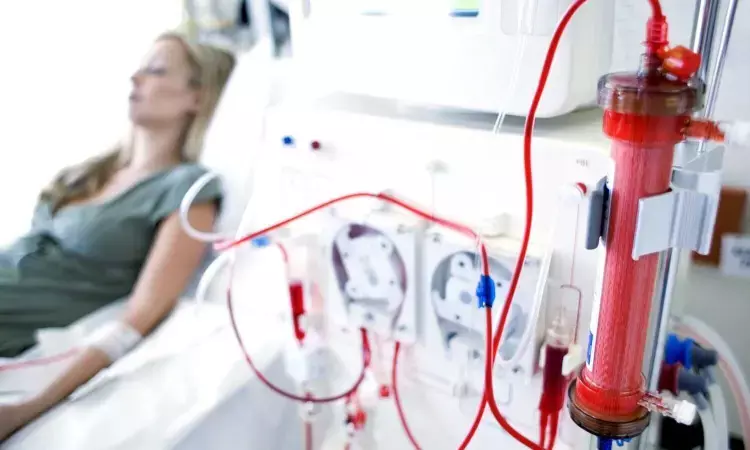- Home
- Medical news & Guidelines
- Anesthesiology
- Cardiology and CTVS
- Critical Care
- Dentistry
- Dermatology
- Diabetes and Endocrinology
- ENT
- Gastroenterology
- Medicine
- Nephrology
- Neurology
- Obstretics-Gynaecology
- Oncology
- Ophthalmology
- Orthopaedics
- Pediatrics-Neonatology
- Psychiatry
- Pulmonology
- Radiology
- Surgery
- Urology
- Laboratory Medicine
- Diet
- Nursing
- Paramedical
- Physiotherapy
- Health news
- Fact Check
- Bone Health Fact Check
- Brain Health Fact Check
- Cancer Related Fact Check
- Child Care Fact Check
- Dental and oral health fact check
- Diabetes and metabolic health fact check
- Diet and Nutrition Fact Check
- Eye and ENT Care Fact Check
- Fitness fact check
- Gut health fact check
- Heart health fact check
- Kidney health fact check
- Medical education fact check
- Men's health fact check
- Respiratory fact check
- Skin and hair care fact check
- Vaccine and Immunization fact check
- Women's health fact check
- AYUSH
- State News
- Andaman and Nicobar Islands
- Andhra Pradesh
- Arunachal Pradesh
- Assam
- Bihar
- Chandigarh
- Chattisgarh
- Dadra and Nagar Haveli
- Daman and Diu
- Delhi
- Goa
- Gujarat
- Haryana
- Himachal Pradesh
- Jammu & Kashmir
- Jharkhand
- Karnataka
- Kerala
- Ladakh
- Lakshadweep
- Madhya Pradesh
- Maharashtra
- Manipur
- Meghalaya
- Mizoram
- Nagaland
- Odisha
- Puducherry
- Punjab
- Rajasthan
- Sikkim
- Tamil Nadu
- Telangana
- Tripura
- Uttar Pradesh
- Uttrakhand
- West Bengal
- Medical Education
- Industry
Mallory-Weiss syndrome manifesting as upper GI bleed in patients undergoing Hemodialysis: A case report

Shuai-Shuai Shi et al from the Department of Nephrology, Heji Hospital of Changzhi Medical College, Changzhi, China reported Mallory-Weiss syndrome in four patients undergoing Hemodialysis. The case study was published in the journal BMC Nephrology.
Mallory-Weiss syndrome (MWS) is a benign, self-limiting condition that causes gastrointestinal bleeding in hemodialysis patients. It is caused due to the non-transmural lacerations of the esophagogastric junction caused by severe vomiting and other inducements. It is often induced by severe vomiting and manifests as upper gastrointestinal bleeding. Despite the condition having a good prognosis, the early symptoms of hematemesis are often missed, leading to a delay in the diagnosis and complicating the situation.
Researchers from the Department of Nephrology, Heji Hospital of Changzhi Medical College, Changzhi, China reported four patients receiving maintenance hemodialysis with MWS. All patients displayed symptoms of upper gastrointestinal bleeding. The diagnosis of MWS was confirmed by gastroscopy. One patient had a history of severe vomiting whereas the other three reported a history of mild vomiting. Three patients received the conservative hemostasis treatment, and the gastrointestinal bleeding stopped. One patient underwent gastroscopic and interventional hemostasis treatments. The conditions of three of the patients improved. Unfortunately, one of the patients died due to cardiac insufficiency.
Mild cases of MWS can be asymptomatic but most cases of MWS present with hematemesis with a variable quantity of blood. Gastroscopy is used for diagnosing the condition. Any tear of the mucosa, submucosal hematoma, and bleeding are used as the diagnostic criteria. Hemodialysis patients tend to have GI bleeding but the symptoms may sometimes be mild. Certain risk factors like age, uremic toxins, anemia, certain drugs (i.e., nonsteroidal anti-inflammatory drugs), vascular calcification, cardiac insufficiency, related diseases such as diabetes, and various types of vasculitis are predisposing factors for MWS.
Conservative treatment approaches like acid suppression, hemostasis using gastroscopy, and interventional vascular embolization can be used for stabilization. For patients with severe symptoms, gastroscopic hemostasis is the first choice, and interventional hemostasis can also be considered. For patients with mild symptoms, drug hemostasis is the first consideration.
Further reading: Shi, SS., Yang, XZ., Zhang, Xy. et al. Mallory-Weiss syndrome in four hemodialysis patients: a case study. BMC Nephrol 24, 188 (2023). https://doi.org/10.1186/s12882-023-03250-x
BDS, MDS
Dr.Niharika Harsha B (BDS,MDS) completed her BDS from Govt Dental College, Hyderabad and MDS from Dr.NTR University of health sciences(Now Kaloji Rao University). She has 4 years of private dental practice and worked for 2 years as Consultant Oral Radiologist at a Dental Imaging Centre in Hyderabad. She worked as Research Assistant and scientific writer in the development of Oral Anti cancer screening device with her seniors. She has a deep intriguing wish in writing highly engaging, captivating and informative medical content for a wider audience. She can be contacted at editorial@medicaldialogues.in.
Dr Kamal Kant Kohli-MBBS, DTCD- a chest specialist with more than 30 years of practice and a flair for writing clinical articles, Dr Kamal Kant Kohli joined Medical Dialogues as a Chief Editor of Medical News. Besides writing articles, as an editor, he proofreads and verifies all the medical content published on Medical Dialogues including those coming from journals, studies,medical conferences,guidelines etc. Email: drkohli@medicaldialogues.in. Contact no. 011-43720751



